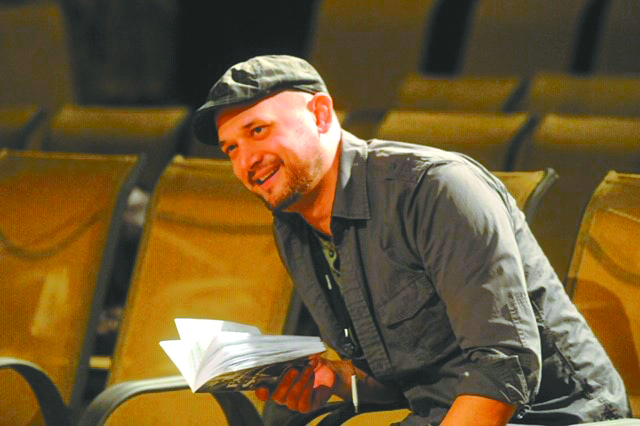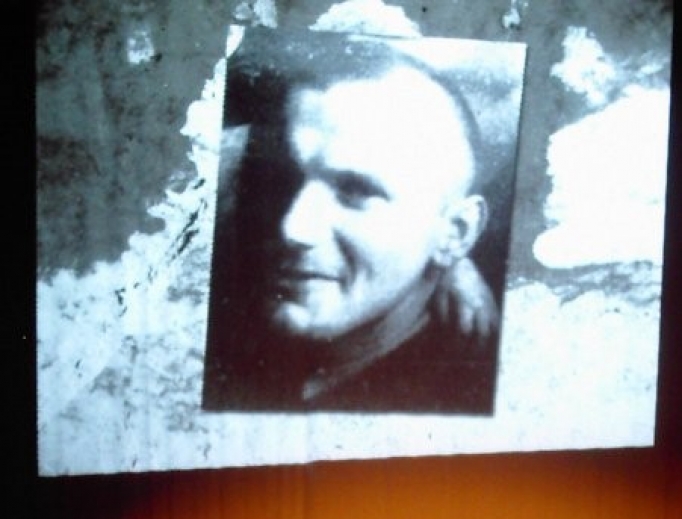Livestreamed ‘Lolek’ Pays Tribute to St. John Paul II
One-man performance will coincide with 100th birthday of the actor-turned-pope.

During many evenings during World War II, Pope St. John Paul II’s friends in Krakow, Poland, could find him performing in plays staged in living rooms — just outside the shadow of Nazi surveillance.
In the spirit of the saint’s Rhapsodic Theatre days and in the age of COVID-19, a Minnesota actor/theater director is inviting theater fans into his living room to commemorate the 100th anniversary of Pope St. John Paul II’s birth through livestream performances of a play about the saint’s early life.

Jeremy Stanbary, co-founder and executive artistic director of Inver Grove Heights, Minnesota-based Open Window Theatre, will perform his one-actor drama, Lolek, on May 18-20 on internet sites.

Not only is it an appropriate way to honor Pope St. John Paul II, but his story of hope during difficult times is encouraging for all ages, including young people, Stanbary said. “It has great relevance for us right now under the circumstances we find ourselves in with the coronavirus,” he said.
“We need messages of hope and beauty and goodness. His life is such a beautiful witness to that.”
The play, titled after Pope St. John Paul II’s childhood nickname, reflects Stanbary’s longtime interest and emulation of the Holy Father, especially his work related to theater and art.
The performances are Open Window Theatre’s effort to bring hope, beauty and goodness to the virtual sphere at a time of stay-at-home orders and as the theater has struggled to continue operating.
Stanbary wrote the play in 2003 and performed it for eight years in the U.S., Canada and Australia, including for EWTN’s Theater of the Word. Because of social-distancing restrictions limiting rehearsals and other technical challenges, performing the one-actor play at home was a good alternative, he said.
The hourlong, livestream performances will consist of a revised and condensed version of the play, which Open Window plans to present as a full-length theater production during its upcoming season.
Lolek focuses on Pope St. John Paul II’s young life up until his priestly ordination, including his involvement in the Rhapsodic Theatre. In his firstperson monologue, Stanbary reveals events, influences, people and experiences that formed the Polish young man into a saint.

“It is a remarkable life, the difficulties and challenges and sufferings and hardships he endured and how he persevered and got through those through a life of faith,” Stanbary reflected.
In 1941 Pope St. John Paul II co-founded the Rhapsodic Theatre (the word “rhapsody” means “reciter of epic poetry”), a style of theater that focuses on the “living word” above dramatic plots, props or elaborate costumes common to other types of theater.
While Poland was under Nazi occupation, the saint and his troupe clandestinely held 22 performances and more than 100 rehearsals as a means of fostering the Polish culture the Nazis sought to suppress, according to papal biographer George Weigel’s Witness to Hope.
Stanbary learned about Pope St. John Paul II’s life and the Rhapsodic Theatre while studying at the University of Nebraska in Lincoln.
In writing the play, he consulted several biographies, including Witness to Hope.
“I was already immersed in his life and vision for the theater; and just knowing what a remarkable young life he had, I was like ‘this is just perfect material for a play and one-man drama.’”
After touring with Lolek and several other plays, Stanbary and his wife, Sarah, co-founded in Minneapolis the professional Open Window Theatre in 2011 to bring together art and a Catholic worldview through plays, including The Lion, the Witch and the Wardrobe based on C.S. Lewis’ novel and Pope St. John Paul II’s The Jeweler’s Shop.
A disagreement with their original theater space’s management forced the Stanbarys and staff to close the theater three and a half years ago. A 2018 mutually agreeable legal settlement, together with a fundraising campaign, enabled them to reopen late last year in their current location. Before they could complete their first production in the new space, they were forced to close the theater because of social-distancing requirements caused by the COVID-19 pandemic. The theater has had difficulty getting government loans and grants and welcomes donations to help it continue operating, said Cole Matson, managing director.
Inspired by Pope St. John Paul II’s hope, which aligns with the theater’s mission of redemption, the theater continues to move forward with the livestream and other virtual performance offerings, Stanbary said. “We’re going to continue to press into the fear and uncertainty and create things of beauty and goodness and hope that we can share with others; and, right now, the only way we can share creative work is online virtually.”
The virtual performance will include some of the play’s mostly instrumental music, which was composed and recorded by Justin Stroh of Lakeville, Minnesota. The music evokes the words of the play in the same way the prayers of the Rosary support meditation, said Stroh, who has composed digital music professionally and currently is director of parish life and evangelization at All Saints Catholic Church in Lakeville.
The melodies and concepts of the music are inspired by Pope St. John Paul II’s life, he said, noting that the saint experienced the tension of persecution but responded with devotion.
“This is what Pope John Paul II did, but he also did this by realizing his talent for acting was a way to quietly be subversive to everything that was happening in Poland,” Stroh said. “The music is trying to support that sense of his life.”
While Stroh found inspiration in the events of the saint’s life, he said he wrote the music for a modern audience.
The play should appeal to audiences of all ages, including young people who may be able to relate to the young Pope St. John Paul II, Stanbary said.
“We’re all looking for answers, clues, ways to work through our suffering and deal with our hardships, and his life was rife with suffering and hardship and yet he remained a hopeful and prayerful person,” he said.
This time of COVID-19 provides an opportunity to revisit the lives of people who inspire us, such as Pope St. John Paul II, pattern our responses to life situations after theirs, and have hope, as the saint did — especially young people who fear they might not have a future, Matson said.
Catholics who feel like they don’t know what the future holds can also find encouragement in Lolek, Matson said.
“I hope this show can remind people that history repeats itself,” he said. “We’re not the only ones who’ve experienced this kind of crisis. We can face these crises and come out of it on the other side. Hope always wins. Love always wins. If anything, God’s providence always wins.”
Susan Klemond writes from
St. Paul, Minnesota.
WATCH ONLINE
Performances of Lolek will be livestreamed at 8pm CDT May 18-20 on OpenWindowTheatre.org as well as on Facebook and Twitter. Each performance will conclude with a live audience Q&A session.

















